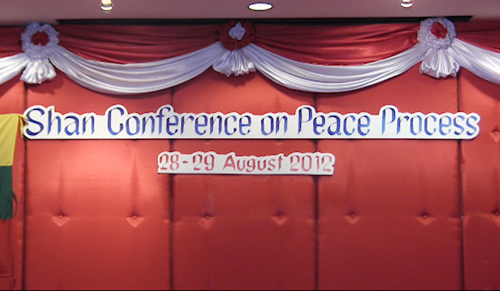The 8 point guideline set by President Thein Sein’s Union Peacemaking Central Committee (UPCC) in May was spurned by a two-day meeting on the Thai-Burmese border of Shan Community-based organizations (CBOs) in exile that ended yesterday.
 The 8 points are:
The 8 points are:
- To remain forever in the Union
- To accept the Three National Causes i.e. Non-disintegration of the Union, Non-disintegration of National Sovereignty and Perpetuation of National Sovereignty
- To cooperate in economic and development tasks legally
- To cooperate in the elimination of narcotic drugs
- To set up political parties and enter elections
- To accept the (2008) constitution and to make necessary amendments in the parliament by majority consent
- To fully enter the legal fold for permanent peace and live, move, work and consume in accord with the constitution
- To coordinate existence of only a single armed forces in accord with the constitution
Earlier, Hkun Htun Oo, leader of the Shan Nationalities League for Democracy (SNLD), had informed the president and his key negotiator U Aung Min that while there should be no problems with points 1-4, points 5-8 would be unacceptable. To which U Aung Min reportedly replied that the said guideline was not carved in stone.
The meeting also resolved to lend the much needed support to the 7 point peace plan adopted by the Working Group for Ethnic Coordination (WGEC) made up of armed movements from the 7 non-Burman states:
- Talks outside each side’s “sphere of influence”
- An international body of observers
- A preliminary dialogue between the government and all armed movements, both ceasefire and non-ceasefire
- A convention among ethnic movements, both armed and non-armed
- A broad-based national convention made up delegates from the ethnic forces, democratic forces and the government
- Decisions reached at the said national convention to be implemented by all concerned
- Completion of the process “before the general elections in 2015”
The resolution read out at the meeting also suggested that for the peace process to move smoothly, not only an international body of observers would be needed but also the presence of the media, both home and international, would be most necessary.
No further details are available.
On 12 June, the Shan CBOs had also made a 4 point call to all stakeholders in the peace process:
- Structural political reform, principally, the amendment of the 2008 constitution
- Withdrawal of Burmese troops from conflict areas
- Strict neutrality by foreign governments and donor organizations
- Suspension of large-scale resource extraction projects until “after there is a genuine political settlement of the conflict, and proper safeguard policies for local communities are in place”
Similar meetings are reportedly being planned in other states, according to the WGEC.



